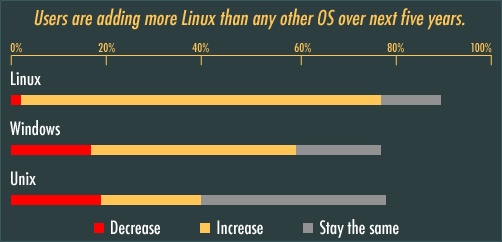The nonprofit Linux Foundation, in partnership with Yeoman Technology Group, has published a new report titled Linux Adoption Trends: A Survey of Enterprise End Users that shows Linux is growing at breakneck speed. According to the report, which is based on the results of an invitation-only survey with 1,948 respondents, Linux adoption continues to grow for a number of reasons, including reduced costs, technical superiority, and security measures.
The survey found that 76.4 percent of companies are planning to add more Linux servers in the next 12 months, while only 41.2 percent of respondents are planning to add Windows servers in the next year and 43.6 percent say they will be decreasing or maintaining the number of Windows servers in their organizations over the same time period. Over the next five years, Linux will outpace all other server operating systems: 79.4 percent of respondents plan on adding more Linux servers, compared to only 21.3 percent planning on adding more Windows servers in the same period. 60.2 percent of respondents reporting that they plan to use Linux for more mission-critical workloads than they have in the past.

Other key findings of the report include:
- Migrations to Linux from Windows are surpassing those from Unix, and 66 percent of users surveyed say that their Linux deployments are brand new ("greenfield") deployments.
- Cloud adoption is surprisingly low, with only 26 percent planning on moving applications/services to the cloud in the coming 12 months. 70.3 percent are using Linux as their primary cloud platform.
- 86.5 percent of respondents feel Linux continues to improve.
- The perception of Linux by management has shifted, with nearly 60 percent reporting that their CIO sees Linux as more strategic to the organization as compared to three years ago.
- These trends are leading companies to increasingly seek Linux IT professionals, with 38.3 percent of respondents citing a lack of Linux talent as one of their main concerns related to the platform.
It's important to remember that all the individuals surveyed are already using Linux, and all are from companies, organizations, and government agencies selected by The Linux Foundation and Yeoman. Nevertheless, the trend toward Linux is definitely happening in enterprise computing, but it's still difficult to truly say to what extent.